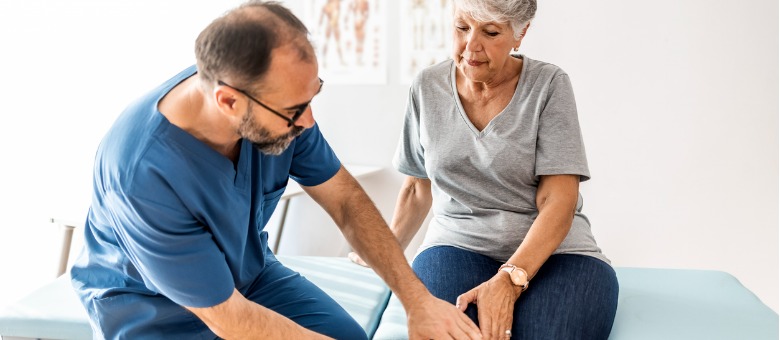
What Is Osteoarthritis?
More than 500 million people worldwide live with osteoarthritis, a degenerative joint disease and the most common arthritis among older individuals. Since it’s a degenerative condition, there’s no way to reverse its effects, but identifying it early and managing your symptoms can help you live a quality life with limited pain.
Osteoarthritis Symptoms and Risk Factors
Osteoarthritis (OA) is a joint disease that affects the tissues surrounding the joint. OA occurs when the cartilage surrounding the joints wears down, and the bones start to rub together. Over time, OA can change bone shape and degrade cartilage, leading to uncomfortable symptoms like inflammation, joint pain, and decreased mobility.
OA can occur in any joint, but it’s most common in the hands, knees, hips, lower back, and neck. It’s a condition often associated with age (most people don’t experience symptoms until after 50). Other risk factors include joint injuries, such as a bone fracture, overuse of a joint, musculoskeletal abnormalities, weak muscles surrounding the joints, genetics, and gender (women are more likely to develop OA than men).
Living with Osteoarthritis
Osteoarthritis can be painful and may limit mobility. While you can’t repair damage from OA, you can make lifestyle changes to slow the progression of the disease.
Exercise
OA is more common in individuals with weak muscles surrounding their joints. Strengthening these muscles through strength training can help limit stiffness and improve mobility.
Strength training isn’t something you should jump into if you’re new to working out. It’s best to start slow and work with a certified personal trainer to stay safe and ensure you’re working muscles correctly. Some great places to consider personal training in Farmington include:
Manage Your Weight
Weight puts stress on your joints, increasing pain and limiting mobility. Managing your weight can help reduce some of the joint stress and discomfort.
It takes a combination of exercise and diet to lose weight, and working with professional coaches and nutritionists is one of the best ways to see results. You can find nutrition information on the San Juan Regional Medical Center website.
Medications
If your discomfort is at a point where it’s inhibiting you from daily activities, talk to your doctor about medications to help relieve your symptoms. Many prescription medications can help reduce inflammation and pain so you can move more easily. You can also talk to your doctor about braces to support your joints or other treatments to ease discomfort.
Support From Visiting Angels
Living with osteoarthritis can lead to challenges in caring for yourself, but the compassionate team of caregivers at Visiting Angels is available to help. Our caregivers are trained professionals who can provide various nonmedical services to help you live more safely and comfortably at home.
Our Farmington, New Mexico office serves seniors in Farmington and the surrounding areas. Contact us at 505-516-1150.
